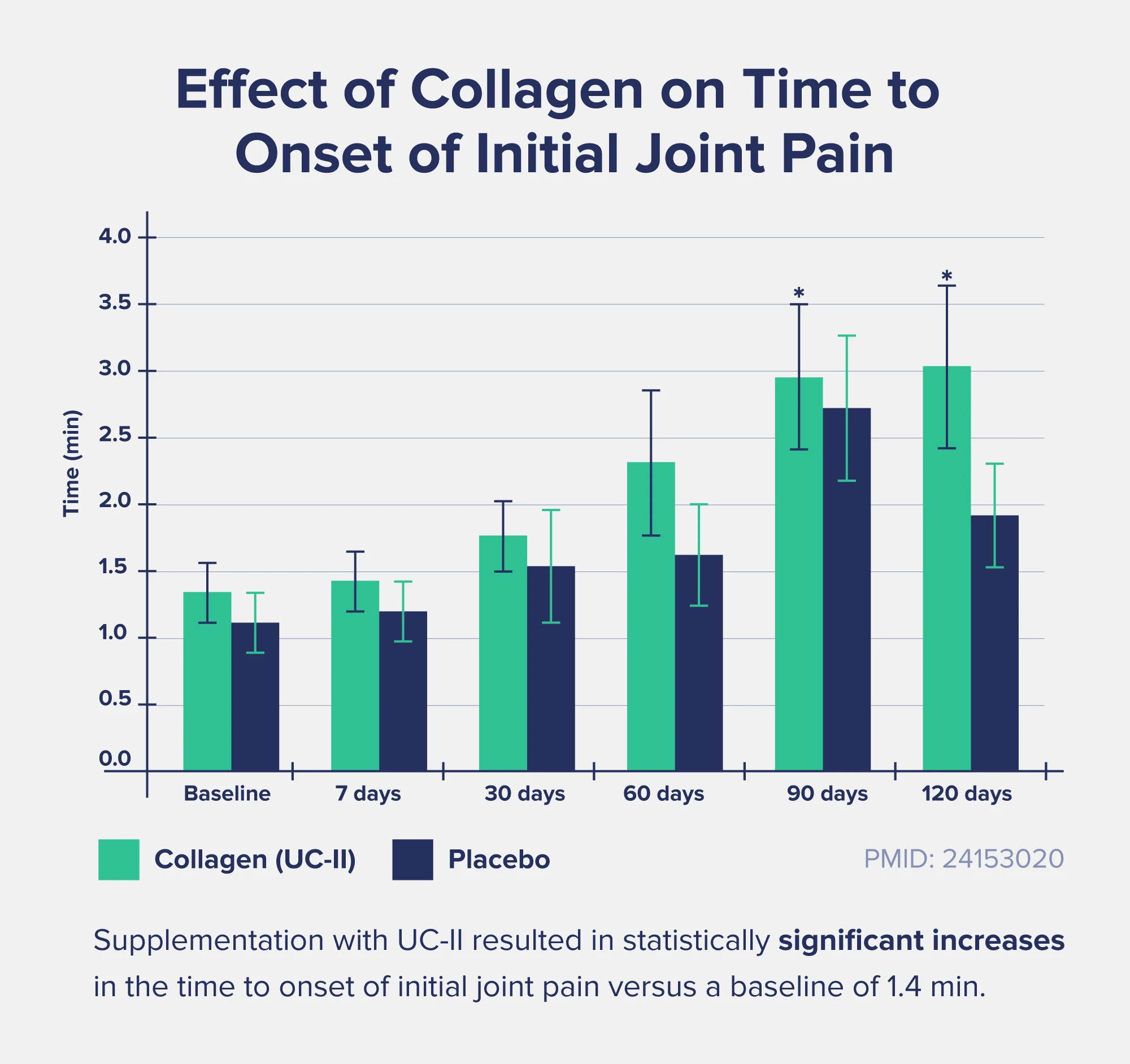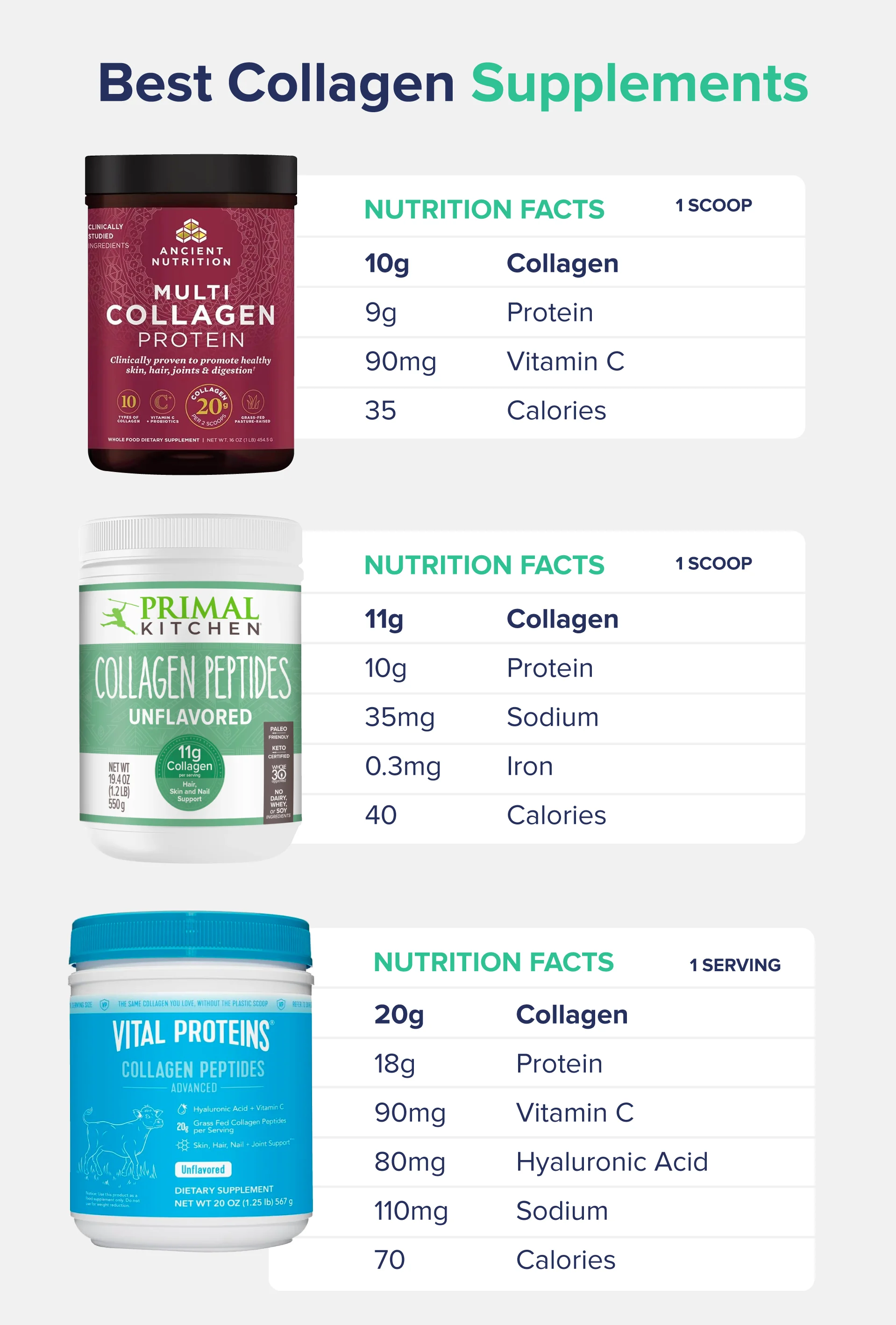Talk to a Registered Dietitian and use INSIDER20 for 20% off!
Talk to a real Dietitian for only $99: Schedule Now
This post contains links through which we may earn a small commission should you make a purchase from a brand. This in no way affects our ability to objectively critique the products and brands we review.
Evidence Based Research To fulfill our commitment to bringing our audience accurate and insightful content, our expert writers and medical reviewers rely on carefully curated research.
Read Our Editorial Policy
People are willing to try just about anything to look and feel younger.
So, while many trendy supplements and diet fads wax and wane in popularity, the buzz for collagen—a protein-packed health and beauty supplement—is here to stay.
This is thanks to the many purported benefits of collagen spanning the internet, which claim that it can improve muscle growth, joint health, the appearance of your hair, skin, and nails, and even prevent bone loss.
But there is a ton of information out there, so it can be hard to understand not only if you should be taking collagen but also what form and—most importantly—how much you truly need.
So, right off the bat, here’s how much you should take if you want to supplement your diet with collagen.
There is no recommended daily dosage for collagen since dietary supplements are not regulated by the U.S. Food and Drug Administration.
However, it is generally considered safe to take collagen daily, as there are few adverse side effects when taking the dosages recommended on the manufacturer’s label.
The recommended dosage depends on which form of collagen you are taking: hydrolyzed collagen, undenatured collagen, or gelatin.
Hydrolyzed collagen: The most common form of collagen supplement. Hydrolyzed collagen (also called hydrolyzed collagen peptides) is the broken-down version of collagen, making it easier for the body to absorb. Hydrolyzed collagen supplements come as capsules or a loose powder you can add to food and drinks.
Studies show you can see health benefits from taking anywhere between 2.5 to 15 grams of hydrolyzed collagen per day.
This dosage range for hydrolyzed collagen is shown to improve skin health, joint pain, and bone density, and the higher dosage could be effective for those looking to build more muscle or just improve their overall body composition (muscle-to-fat ratio).
Undenatured collagen: A form of Type II collagen (collagen found in the joint cartilage) derived from chicken sternum cartilage.
In several animal studies, undenatured collagen was shown to improve symptoms of osteoarthritis. Over time, it may reduce cartilage damage by limiting the inflammatory T-cell response that leads to osteoarthritis.
It has also been shown to be more effective at improving joint pain than glucosamine and chondroitin supplements, commonly used for humans and animals. There is no recommended dosage for undenatured collagen, but this study concludes that adults taking 40mg per day may see improvements in joint health and reduced joint pain.

Gelatin: While similar, this is not technically considered collagen as it is a degraded form of collagen commonly used as a food additive in cosmetics and capsules.
Gelatin can be used as a medicine or supplement, but you should speak with a medical provider before consuming any gelatin supplements.
Studies do not report any severe side effects from consuming collagen supplements, so it’s generally considered safe and non-toxic. Of course, this doesn’t mean it’s impossible to take too much collagen.
Taking collagen supplements requires a consultation with your doctor if, for some reason, you want to take more collagen than the recommended daily dose.
Some people report some discomfort (upset stomach, a feeling of fullness, and mild nausea) when taking high doses of collagen, but the symptoms go away after reducing intake.
Of course, if you are allergic to some of the components of a collagen supplement (such as a shellfish, egg, or a rare meat allergy), you will want to read the ingredient list. Always ask your doctor if you’re unsure.
Collagen is the most abundant protein in the human body.
Without getting too into the nitty gritty of it, collagen essentially forms the structure, or “scaffolding,” on which our muscles, skin, bones, cartilage, and organs are built.
There are five different types of collagen in the human body:
Type I: Skin, bones, tendons, and ligaments (90% of the body’s collagen)
Type II: Elastic cartilage found in healthy joints
Type III: Muscles, arteries, and organs
Type IV: Skin
Type V: Cornea of the eyes, hair, and in certain layers of the skin
We can get all the collagen we need from a healthy diet. However, some research asserts that supplementing with collagen could provide some additional health benefits.
As we age, our collagen production slows down. It’s estimated that our bodies lose around 1% of collagen per year after the age of 40.
You can make lifestyle choices to slow down this precipitous loss, including avoiding UV exposure, not smoking, and eating a well-balanced diet with fewer refined carbohydrates and added sugars.
Topical and oral collagen supplements have been studied to determine the effectiveness of these products.
While many studies conclude that collagen has health and beauty-related benefits, some are funded by groups that would benefit financially from positive results.
That said, there is some unbiased evidence of collagen’s effectiveness, and there is little to no harm in taking it as a daily supplement.
So, if you take a collagen supplement and see or feel improvements, great! If not, it does no harm, and you can just remove it from your supplement regimen.
This review of the existing clinical studies on collagen summarizes evidence that it can:
Currently, collagen is not regulated, nor has its effectiveness as a dietary supplement been tested by the FDA. So, there is no guarantee that claims about its efficacy on supplement product labels are accurate or will work.
With that being said, it is relatively safe and considered non-toxic, with few, if any, side effects beyond mild stomach upset with excess consumption.
Supplementing with collagen is not always necessary, as certain foods contain collagen or the essential amino acids and nutrients required to produce collagen naturally.
You are likely getting enough collagen if you eat a varied diet and monitor your protein intake.
In particular, animal products such as fish, beef, chicken, pork, and eggs have a high collagen content.
Additionally, you can also eat these foods to boost your collagen intake naturally:
For those who follow a plant-based diet, consider supplementing with collagen since no natural plant sources exist.
Unlike maintaining your protein intake, if you follow a strict vegan diet, you cannot consume collagen in any form, including supplements, since it is derived from animal products.
However, you can naturally enhance your body’s collagen production or synthesis pathways by eating foods high in Vitamin C and amino acids like glycine, proline, and hydroxyproline, as well as zinc.
These foods can help with collagen production:
Some supplement companies sell “vegan” collagen gummies, but be sure to read the label carefully, as these do not contain collagen but rather collagen-boosting vitamins.
If you want to get more collagen into your diet, you have a variety of options for collagen supplementation.
As for which is most effective, whether it’s a powder, pill, or gummy supplement, most types of collagen supplements will affect the body similarly.
The best advice in this case is to use whatever supplements best fit your budget and you will remember to take.
Collagen Powders: Collagen powders are typically made from either bovine collagen (cows), porcine collagen (pork skin), or marine collagen (fish skin and scales). In its flavorless powder form, you can add it to soups, cold drinks and smoothies, stews, and other foods without compromising the taste.
Collagen Gummies: Collagen is also sold as gummies, flavored chewable supplements. There are no additional health benefits from taking a collagen gummy other than the fact that some might find edible types of collagen like gummies easier to remember to take (and more enjoyable) since they’re kind of like candy.
Collagen Capsules: For those who prefer the most efficient option, hydrolyzed collagen powder is also sold in capsules if you want to take a supplement and be done with it.
Nutrition Insider has a list of Trusted Brands we know we can count on to provide high-quality supplements to our readers.
When it comes to collagen supplements, here are a few we recommend you try:
Ancient Nutrition Multi Collagen Protein
Nutrition Facts:
1 Scoop =
10g Collagen
35 Calories
9g Protein
30mg Vitamin C (100% DV)
Primal Kitchen Unflavored Collagen Peptides
Nutrition Facts:
1 Scoop =
11g Collagen
40 Calories
10g Protein
Vital Proteins Collagen Peptides (Advanced)
Nutrition Facts:
1 Serving =
20g Collagen
70 Calories
18g Protein
90mg Vitamin C (100% DV)
80mg Hyaluronic Acid (for skin elasticity and hydration)

Consider taking between 2.5 to 15 grams daily. The lower end of this range is good for improving skin and joint health, whereas the higher end can be beneficial for muscle growth.
Taking 20 grams of collagen a day is not too much, but excess collagen consumption can lead to stomach discomfort in some individuals. So, if you feel that “too full” feeling, upset stomach, nausea, or other digestive issues, just reduce the amount of collagen you’re taking.
There is no “right time” to take collagen. Collagen is best taken when you remember to do so. If that’s before breakfast in the morning, before dinner at night, or just before bed, then that’s the right time.
Hydrolyzed collagen powder or capsules is the most popular and well-tolerated form of collagen. The powder form can be added to many different foods or consumed in drinks. Capsules can be taken any time of day, though consuming them on an empty stomach is recommended.
No, collagen cannot be derived from plants. Some “vegan” collagen gummies are sold on the market, but these do not contain collagen but rather collagen-boosting vitamins and nutrients.
Foods with high amounts of collagen:
• Animal products, including fish, chicken, beef, pork, and eggs
• Meat with lots of connective tissue (brisket, pork shoulder, etc.)
• Organ meats
• Bone broth
Foods that promote collagen synthesis:
• Foods high in Vitamin C and amino acids like glycine, proline, and hydroxyproline, as well as zinc:
‣ Legumes
‣ Soy
‣ Nuts
‣ Seeds
‣ Whole grains
‣ Citrus fruits
‣ Berries
‣ Bell peppers
‣ Leafy greens
‣ Tomatoes